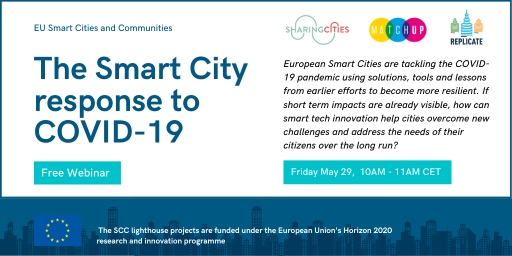
29/05/2020
European Smart Cities are tackling the COVID-19 pandemic using solutions, tools and lessons from earlier efforts to become more resilient. If short term impacts are already visible, how can smart tech innovation help cities overcome new challenges and address the needs of their citizens over the long run?
Agenda:
10.00-10.05: Introduction by the moderator Albert Engels (RUGGEDISED) on behalf of the 17 European Smart City Lighthouse Projects.
10.05-10.15: Input from the European Commission
What is the status of the European Smart Cities and Communities in relation to COVID-19. How will it influence the future and what actions are taken on a European level?
10.15 – 10.25: Case 1: Valencia, global ICT actions and citizens platforms
Topic 1 – Ernesto Faubel, MAtchUP coordinator:
Valencia leads the UN task force for the COVID-19 emergency (under the United Nations’s agency for International Telecommunication) and will present their work and the city’s effort to provide a global data-sharing platform and develop a policy framework for smart management of public health emergencies in cities. Data will come from mobility, water consumption and garbage collected during confinement.
Topic 2 – The local initiative “Frena La Curva” AKA Stop the spread
Stop the Curve (FLC) is a citizen platform where volunteers, entrepreneurs, activists, social organizations, makers and laboratories of public and open innovation cooperate to channel and organize social energy and civic resilience to the Covid-19 pandemic by providing a civil society response complementary to that of government and essential public services.
10.25 – 10.35: Case 2: London, Building Resilience at Scale
Sandy Tung, Programme Manager for Sharing Cities
This case, based on London as a Lighthouse City in Sharing Cities, will discuss key lessons from the Sharing Cities programme, the role of smart technology in helping cities’ recovery efforts, and its opportunities for scale-up in the COVID-19 recovery.
10.35 – 10.45 Case 3: Florence, use of traffic sensors for monitoring vehicles flow during lockdown
Alessandra Barbieri, Florence’s Replicate Project Manager and Chiara Lorenzini, City of Florence
During these difficult times, cities have had to adapt to the current situation. The city of Florence, which is located in one of the most affected countries by COVID19 worldwide, tells us about how the city has used traffic sensors for monitoring vehicle flow during lockdown.
10.45-11:00: Open discussion and conclusions
Question from attendees through the digital raising of hands. Throughout the webinar attendees and panelists will also be encouraged to ask/answer questions in the Q&A.
